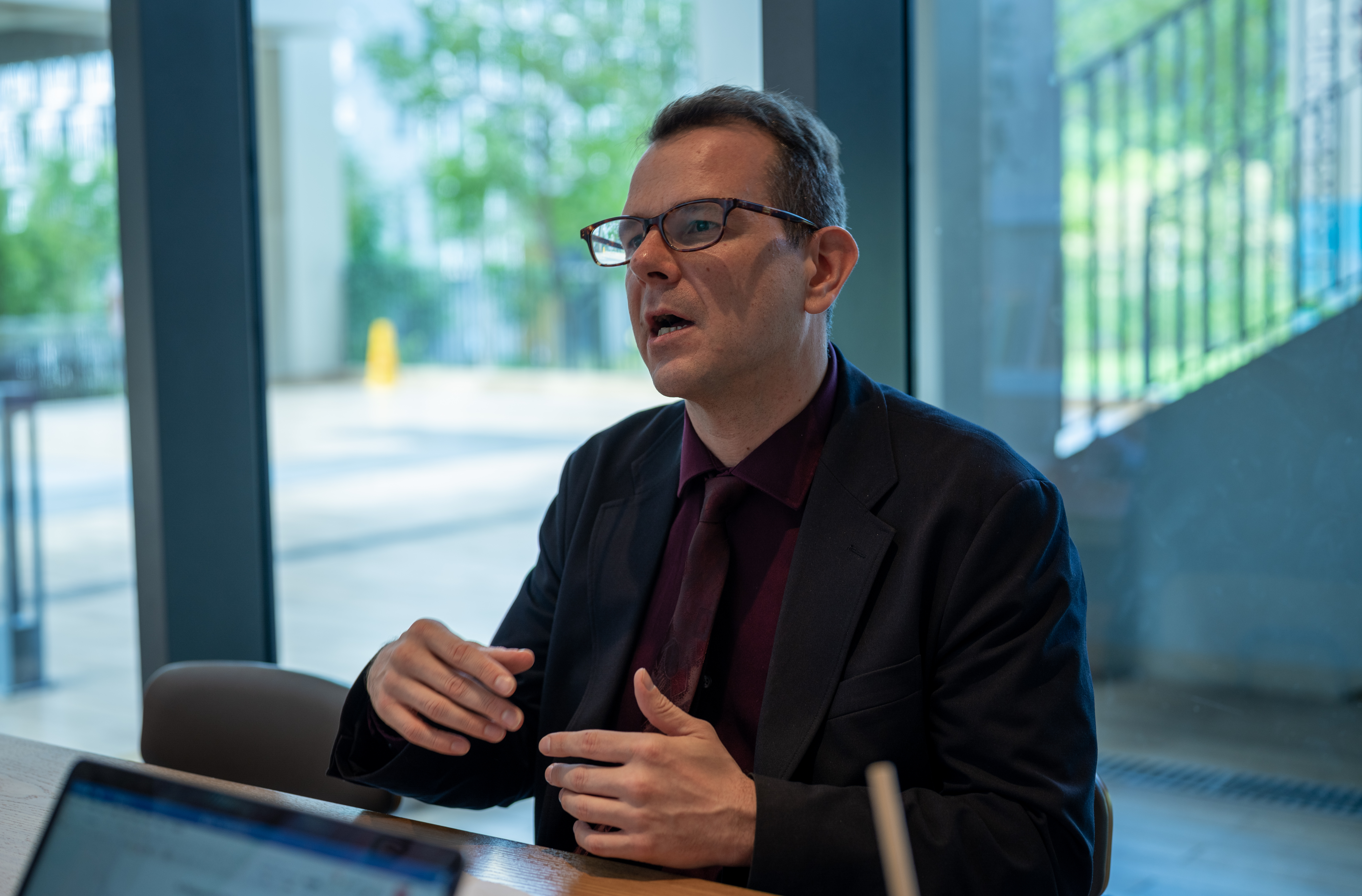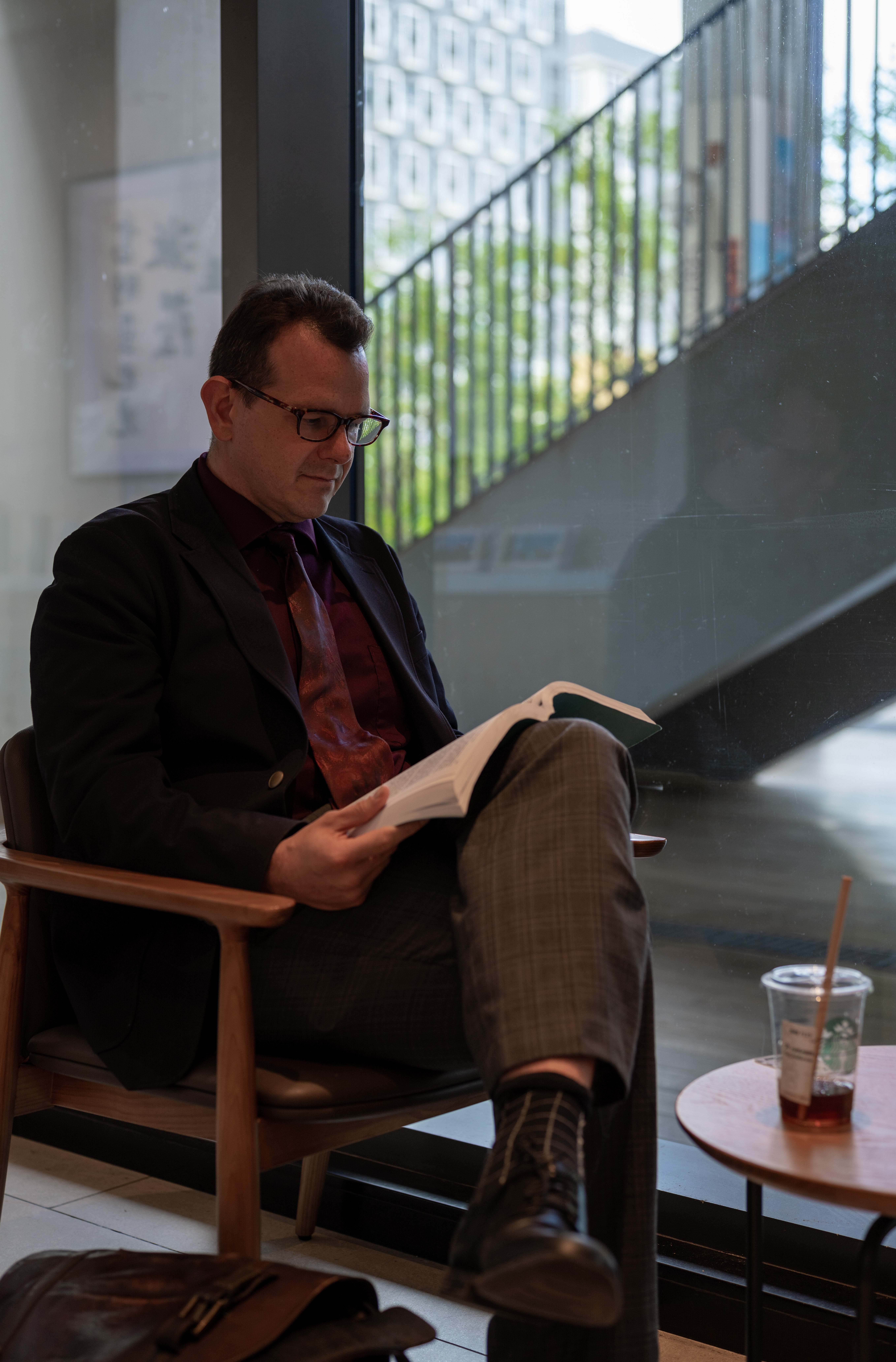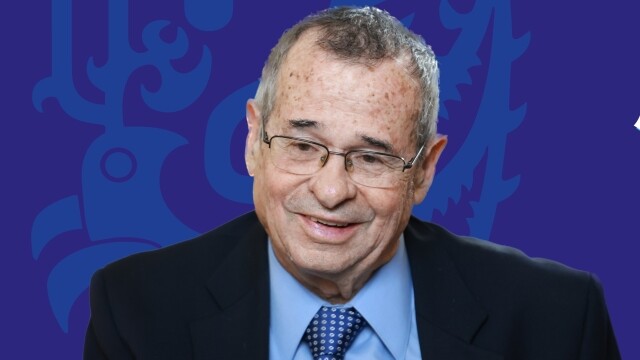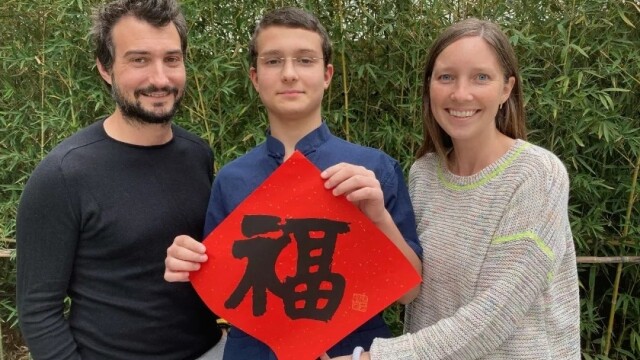Feature Stories
Dr. Christopher Kluz
Lecturer in General Education,
Deputy Director of GE Division
Dr. Christopher Kluz was educated at the University of Chicago and received his Ph.D. in Philosophy from Emory University. He has taught at Emory University as well as a number of liberal arts colleges in both the United States and Korea. While having some research interests in moral psychology and Early Modern Philosophy, Dr. Kluz is primarily interested in teaching the classic philosophical texts of Western Civilization. In addition, his philosophical and personal interests cover a wide range of topics in literature, art, and film.
If you ask students who is the most famous teacher in our university, then Chris (Dr. Christopher Kluz) will be a competitive candidate. If you ask students what is the dominant phenomenon in our university, then Peer Competition will be their intuitive answer. If you ask students which mood is constantly hovering over their minds, then Anxiety will receive most of the votes. Finally, if you ask me what is the best way to deal with the Anxiety caused by peer competition, then I will strongly recommend you to do philosophical thinking.
In this dialogue, Chris will share his insights into Peer Competition and Anxiety from a philosophical perspective as well as give us a general introduction to philosophy and his philosophical life.

- Hi, Chris, I think you are quite famous in our university, and many students in our university are curious about your philosophy career, like why you choose to study philosophy and how you join our university. Can you share your experience with us?
When I was an undergraduate, I initially wanted to study physics, but I didn't do well in physics in my first semester. So I thought maybe physics wasn't such a great idea. And at that time, I was also taking a philosophy course, which was about ancient Greek philosophy. I really enjoyed that course. So in the second semester, I started doing modern philosophy and I read Descartes. All of a sudden, I realized that I really want to study philosophy. So I declare philosophy as my major. For me, when I decided to major in philosophy, it was a commitment to academic life.
While writing my dissertation during graduate study at Emory University, I found out that I didn't like doing research so much. I was doing something very specific, and I didn't really have anyone to talk to. I finally realized that what I rather do was teach philosophy. After finishing my dissertation, I went on the job market twice. As you know, it’s really difficult to get a job in academia, especially in philosophy. There are few jobs offered in any given philosophy area and almost none that are teaching positions.
I did get a teaching position in a Korean university, but it didn’t satisfy me much. Finally, my friend Lucas saw a job posting about the recruitment of lecturers that teach General Education, which was posted by CUHK(SZ). We both applied for the job and we both got it.
It turns out to be an amazing job for me, not just because it's a wonderful school, but also because teaching courses under General Education is exactly what I want to do.
- During these years in teaching, are there any students that really impress you?
In general, I'm really impressed by the students here in all of my classes.
And I think that there are many students who I think I'm quite impressed by. Right now, there are two that I am thinking of, and I'll tell you a little bit about them.
They were both SSE students and they were very good in their majors. One of the things that I really loved about them was that even though they were SSE students, they were really interested in philosophy and other cultural, intellectual things. They wrote wonderful papers, and their discussions always involve many deep ideas. For example, I'm really surprised by the paper written by one of them because she referred to Tolstoy and many other deep ideas that we didn't talk about in the class.
I really got this impression that she is a very well-rounded person who's very good at not only her own field but also many other areas that she is interested in.
- Some people may think that philosophy is quite far away from our everyday life. What do you think of such a view? Can you explain what philosophy is to them?
Yeah. So I can talk about philosophy in many different ways. Philosophy is a very nebulous term. There's academic philosophy, and there are other kinds of philosophy. I think there is a historic way of thinking about what philosophy is. When the university was created, there were four things that you can study: Theology, Medicine, Law, and Philosophy. So everything that was not theology, law or medicine was considered to be philosophy.
So I think philosophy used to be the study of almost everything. It's literally the love of wisdom. And I believe contemporary philosophy is still a general discipline. We can have a philosophy of almost every other discipline. There is philosophy of art, philosophy of physics, philosophy of mathematics, etc. So philosophy is more like a critical way of thinking about other disciplines.
Philosophy is also a way of life. I think studying philosophy is not merely about studying a set of theoretical problems in a domain, I mean, it is also about transforming the knowledge we get from the world into the way we live in the world. My favorite philosophers are exactly those who live a philosophical life, such as some ancients like Plato and Aristotle, as well as some Hellenistic philosophers, especially Stoics and the modern Stoic Spinoza.
So if philosophy can be taken as a way of life, then we can all be philosophers as long as we live in a certain way. Doing philosophy is not necessarily equivalent to writing great philosophical work, which is a great difficulty even for many academic philosophers.

- Now I want to talk about something about the peer competitions among students in our university. I think most of the students in our university are quite competitive in academic performance, but few of them get satisfactory academic outcomes (e.g., satisfactory high GPA). Many people think that students in our university are facing excessive internal competition. What do you think of this phenomenon, and can such phenomenon be averted?
I think some people are overly ambitious. But one problem is that there are really limited resources. The resources will not change even if you compete really hard. So sometimes people’s ambitions are not fulfilled, and they may then feel a sense of meaninglessness of competition. I think Such meaninglessness goes well beyond those people’s thoughts on it. Even when you get what you want, you may still have a sense of meaninglessness. I think this is where we have to reflect.
I think our activity in life should be one that we enjoy for its own sake. It's really important to enjoy what you're doing. And this is why I mentioned those students who I was very impressed by. I think that they just enjoyed what they're doing. I think there's a problem with students who work really hard at something that they're not interested in. They may often have a kind of so-called “existential problem” because they feel like they are forced to work on something.
Sometimes it could be difficult for us to choose to work on what we are interested in. We don't all get the opportunity to work on the things that we want to. This is why it's important for one to be well-rounded because a job is just a job. You need a job to survive, but there are other things in life too.
And it doesn't have to be that your entire life is revolved around making money or being successful. You can define what success is for you. And I think this is the problem with involution is that we are looking at success by a certain kind of standard that's becoming more and more extreme that causes people to work in a more and more extreme way. But we're not questioning whether this is actually what we defined as success for ourselves. Right? This is one of the things that philosophy can teach us. Stoic once said: “don't compare yourself to other people.”
So If you want to study really hard and you enjoy it, then do it. But don't be envious of other people's high GPAs. You have to think in this way: “do I want to do all the things that they do?”
- From my observation, many students will use the word “involution” to criticize someone whenever he or she is considered to be putting excessive effort into studying. Do you think such a critic is ethical?
I think it is a natural tendency for one to use the word “involution” negatively in order to criticize others. We live with other people. We're constantly comparing ourselves with other people. One of the things that we do is we want to affirm that our way of living is better because we're anxious about measuring up to other people. This is just a natural tendency for human beings.
But we also have philosophers like Kant and Hegel and the Stoic, and they are constantly advising us not to do this because for them morality is about overcoming this natural tendency.
For me, there isn’t anything unethical about it. But I think it's important for us to be aware of why we do such criticism, and to figure out what we're really concerned about. We all have to define what a good life is for ourselves and not worry about what success means for other people all the time.
I think working hard will not necessarily bring us a good life if our life quality depends upon external goods. Our life quality will then be dependent on fortune, which is out of our control. And what we should do, is eventually, to make our lives more immune to the fortunes.
- In the contemporary world, people seem to be more anxious than before. What is the main cause of such phenomena?
This is a huge question, and there are so many aspects of what I would say. I think such modern anxiety that people now have indicates that we live a better life than before.
We are no longer concerned about mere survival, right? We have more time to reflect on our lives in a certain way that might lead to certain kinds of satisfaction.
In the pre-modern era, people were just absorbed in doing things and surviving. They may seldom reflect on things like “what counts as a good life”. But in the modern era, people may go to the other extreme: they may be overly reflective.
I am thinking about a novel called Madame Bovary. Madame Bovary is a woman who lives in a province of France, and she gets married, and she has a perfectly fine bourgeois life. She loves reading exciting romance novels, and she wants to get such excitement in real life. So She becomes quite disappointed about her marriage which is kind of dull. And she has affairs. And She ruins her life. And she commits suicide in the end. Why she eventually commits suicide? Well, I think it is because of her over-reflection on the meaning of life.
We are overly reflected, not because we're philosophical, but because we're constantly forced to be thinking about how to live in an unhealthy way. We are surrounded by so many advanced technologies. We don't relax. Have a relax guys.
- I think sometimes studying philosophy makes people sad. When we realize how widely the opinions of those great human minds can diverge, we may feel a kind of loss: What is the truth? What do you think of such sadness of studying philosophy? If possible, how should we avoid it or cope with it?
There's a couple of things I’d like to mention. You're talking about the idea that philosophy might make people a little bit sad and melancholy or depressed because of its content.
But I think in the opposite way. I think philosophy is a kind of remedy. I think people who are attracted to philosophy may have a certain kind of sickness of the soul. I think a lot of people are attracted to philosophy because they have questions that they want to answer. They may have a certain kind of anxiety and they start to wonder about the meaning of life.
When I was younger, I was very much appealing to certain philosophers. At that time, I felt a certain kind of anxiety and I was questioning what's the meaning of life. So I was very attracted to certain philosophers who addressed these issues, for instance, Nietzsche and Kierkegaard. And as I was getting older, I turned to favor in some philosophers that really provide solutions to these issues, like Spinoza the Stoics. These are big issues, right? But we can try to deal with them.
I am kind of reluctant to admit that studying philosophy will bring people a kind of sadness or anxiety. My favorite philosopher is Spinoza, who is often considered to be one of the happiest philosophers. He died at a pretty young age. I think I'm now older than him.
He was exiled from his community, and it was quite odd to be out of the community in that era. He was dealing with the big issue (i.e., the meaning of life). But he lived a good life regardless of all these things.

- Last question. I think many students and teachers in our university are interested in philosophy especially the history of philosophy, but they just don't know where to start. Do you have any suggestions for them? Like can you suggest some philosophical texts for them to be the starting point?
Well, I think this is always a difficult question because the answer depends on what kind of philosophy you're interested in. So what I can do is to share my reading interests, which I think can also work for a lot of people.
I’m interested in the history of philosophy, so I think it's always good to start at the beginning of the history of philosophy because you don't need to know much about philosophy before reading. For example, you can read someone like Plato. I suggest Plato for several reasons, one of which is that it's enjoyable to read.
I also think Descartes is an interesting place to start. And this suggestion, again, is for historical reasons. One of the features of Descartes’s philosophy is that he starts his arguments from the beginning. Well, he's not really starting from the beginning, because you have to understand all the people before him in order to fully understand his philosophy. But anyway, his philosophy is an interesting place to start.
Another book that I would suggest is Bertrand Russell’s The Problems of Philosophy, which is a short little book.
Those are all interesting places for one to start.
Student Journalist / Zhang Zhiyuan Wang Yifan


